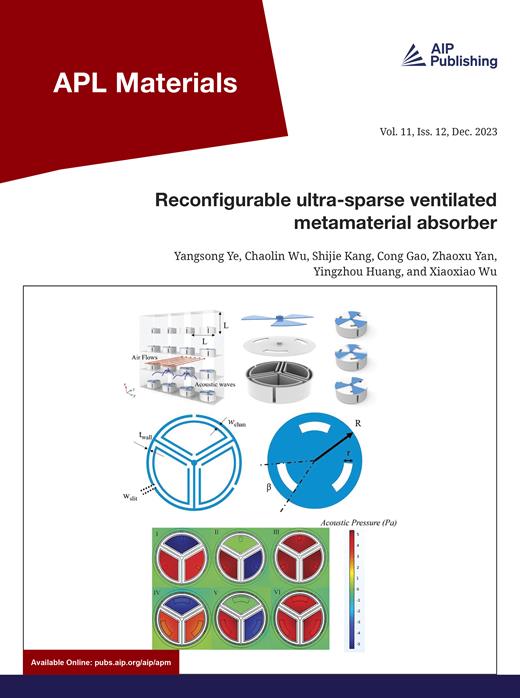Enhancing terahertz magneto-optical effects in wafer-scale RIG single crystal thick films with anti-reflective coatings for improved transmittance
IF 5.3
2区 材料科学
Q2 MATERIALS SCIENCE, MULTIDISCIPLINARY
引用次数: 0
Abstract
Wafer-scale rare-earth iron garnet (RIG) single crystal thick films were fabricated on 3-in. gadolinium gallium garnet (GGG) substrates using liquid phase epitaxy. The terahertz transmittance of the RIG crystals improved after removing the GGG substrate by polishing. The time-domain spectra at Terahertz (THz) frequencies indicate the existence of a magneto-optical effect in RIG samples. The results indicate that the RIG samples exhibit a high refractive index of ∼4.50 within the 0.1–1.0 THz frequency range, a transmittance of around 40%, and an absorption rate of only 10–50 cm−1. The Faraday rotation angles of the thick single-crystal films of the RIG samples were measured using a THz-TDS system. The RIG has a thickness of ∼330 μm. The Faraday rotation angles of RIG crystals at THz frequencies can reach up to 16° when an external magnetic field of 0.18 T is applied. The Verdet constants of the RIG sample were calculated to be ∼120°/mm/T. To improve the transmittance of the RIG sample, epoxy resin and polymethylpentene (TPX) were used as anti-reflective films. The transmittance of the RIG sample increased by ∼5% for the 80 μm thick epoxy and about 10% for the 320 μm thick TPX. Therefore, this RIG single crystal thick film can achieve a low loss, a high transmittance, and a strong magneto-optical effect in the terahertz region with the cooperation of a reflection-reducing film. It is expected to have wide applications in terahertz magnetic polarization conversion, non-reciprocal phase shifters, and isolators.利用抗反射涂层增强晶圆级 RIG 单晶厚膜的太赫兹磁光效应,从而提高透射率
利用液相外延技术在 3 英寸钆镓石榴石(GGG)衬底上制作了晶圆级稀土铁榴石(RIG)单晶厚膜。通过抛光去除 GGG 衬底后,RIG 晶体的太赫兹透射率有所提高。太赫兹(THz)频率的时域光谱表明 RIG 样品存在磁光效应。结果表明,在 0.1-1.0 太赫兹频率范围内,RIG 样品表现出 ∼4.50 的高折射率,透射率约为 40%,吸收率仅为 10-50 cm-1。使用 THz-TDS 系统测量了 RIG 样品厚单晶薄膜的法拉第旋转角。RIG 的厚度为 ∼330 μm。当施加 0.18 T 的外部磁场时,RIG 晶体在太赫兹频率下的法拉第旋转角度可达 16°。经计算,RIG 样品的维尔德常数为 ∼120°/mm/T。为了提高 RIG 样品的透射率,使用了环氧树脂和聚甲基戊烯(TPX)作为抗反射膜。80 μm 厚的环氧树脂和 320 μm 厚的 TPX 使 RIG 样品的透射率分别提高了 5%和 10%左右。因此,这种 RIG 单晶厚膜可以在太赫兹区域实现低损耗、高透射率和强磁光效应,并能与减反射膜配合使用。它有望在太赫兹磁偏振转换、非互易移相器和隔离器中得到广泛应用。
本文章由计算机程序翻译,如有差异,请以英文原文为准。
求助全文
约1分钟内获得全文
求助全文
来源期刊

APL Materials
NANOSCIENCE & NANOTECHNOLOGYMATERIALS SCIE-MATERIALS SCIENCE, MULTIDISCIPLINARY
CiteScore
9.60
自引率
3.30%
发文量
199
审稿时长
2 months
期刊介绍:
APL Materials features original, experimental research on significant topical issues within the field of materials science. In order to highlight research at the forefront of materials science, emphasis is given to the quality and timeliness of the work. The journal considers theory or calculation when the work is particularly timely and relevant to applications.
In addition to regular articles, the journal also publishes Special Topics, which report on cutting-edge areas in materials science, such as Perovskite Solar Cells, 2D Materials, and Beyond Lithium Ion Batteries.
 求助内容:
求助内容: 应助结果提醒方式:
应助结果提醒方式:


